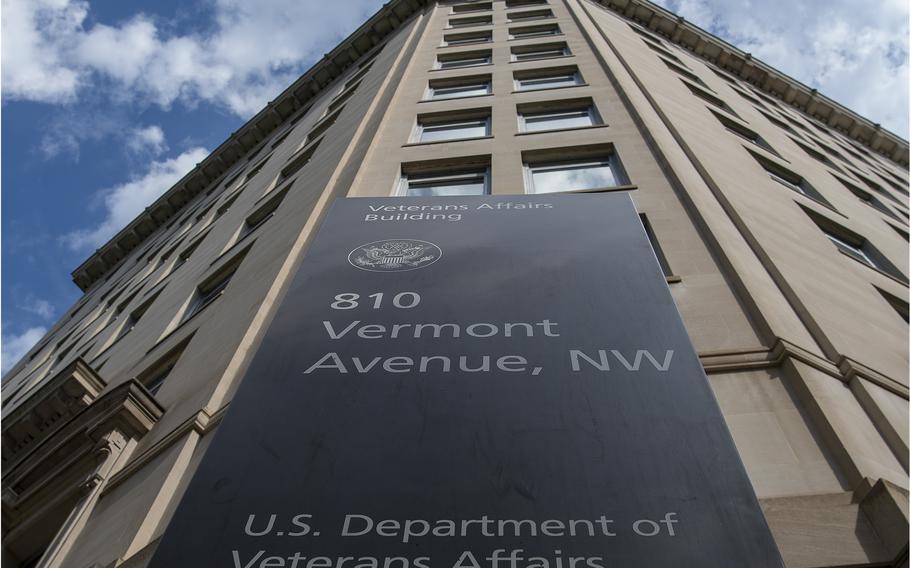
The Department of Veterans Affairs headquarters building as seen in Washington, D.C., on July 6, 2022. (Carlos Bongioanni/Stars and Stripes)
WASHINGTON — Republican lawmakers clashed with Department of Veteran Affairs leaders at a hearing Wednesday over the VA’s fee-for-service agreement with Immigration and Customs Enforcement to handle the medical claims of illegal immigrants in detention.
At issue was VA’s long-standing financial arrangement with ICE to process claims and payments to local health care providers who treat detainees, which in fiscal 2023 yielded $124 million in fees and other revenue to a VA revolving fund.
But Reps. Matt Rosendale, R-Mont., and Jennifer Kiggans, R-Va., of the House Committee on Veterans’ Affairs questioned whether VA’s financial agreement with ICE is exacerbating health care shortages for veterans.
Rosendale said he wants to ensure immigrants are “not being prioritized” over veterans by medical providers in their local communities.
“This arrangement could result in illegal immigrants receiving medical treatment before veterans do and quite frankly, to this committee, that’s completely unacceptable,” Rosendale said.
Terry Riffel, the VA deputy assistant secretary, responded: “I don’t know if that’s possible. We would have to confirm that.”
Riffel said the VA would need to examine the issue before providing a response, adding “wow, that’s an assertion ...” before Rosendale interrupted her.
“What can you show me that proves they are not in the same networks — and that illegal immigrants are not being prioritized over veterans?” Rosendale said, accusing Riffel of evading his question.
Kiggans, who is the chairwoman of the subpanel that held the hearing, said the House VA committee obtained a copy of the VA’s financial agreement with ICE for processing the medical claims of detainees.
The VA’s financial agreement with ICE, which has been in place since 2002, is handled through a revolving fund program that is “less transparent” in the disclosure of finances, she said.
Revolving funds are designed to be self-supporting and can make a profit through the collection of fees for providing services, Kiggans said. The VA’s two largest revolving funds each collected $1.8 billion in the last fiscal year, she said.
“ICE pays the VA for health care claims as well as fees to cover the VA’s administrative costs as well as a profit,” Kiggans said. The revenues collected help the VA to finance operations.
The VA’s revolving funds that allow for fee-for-service agreements with other federal agencies was the subject of the hearing, but most of the discussion focused on VA’s financial agreement with ICE and whether the VA is taking health care resources that could benefit veterans and using them for illegal immigrants.
“Veterans should have no question about the ability of VA to be there for them,” Rep. Chris Pappas, D-N.H., said, noting the medical benefits being paid out under the PACT Act to veterans exposed to toxic substances during military service.
“Any sort of political narrative that’s ginned up to try to sow doubt among veterans is dangerous and is counterproductive to the work that is ongoing at VA,” Pappas said, referring to legislation that Rep. Mike Bost, R-Ill., introduced last month to block medical claims processing by the VA for illegal immigrants.
But Rosendale persisted in questioning VA leaders over whether community-based providers might be prioritizing care and treatment for ICE detainees because the VA is processing their payments.
“Do you think it’s fair — if that is taking place — if illegal immigrants are utilizing the same community health care of providers that our veterans are supposed to be utilizing and they are keeping our veterans from receiving their care, do you think that that is fair?” Rosendale asked Riffel.
Riffel explained ICE — not the VA — has the responsibility for the coordination of care of immigrant detainees.
“VA does not get involved,” she said. “We are just processing claims and are not involved in where or how [detainees] are receiving care.”
The agreement with ICE has “zero impact on veteran health care or benefits,” Terrence Hayes, the VA press secretary, said after the hearing. “None of the employees have been diverted from other roles, and no resources meant for veterans are used as part of this agreement.”
Hayes said the processing agreement involves no more than 10 VA employees and ICE pays for it.
Rep. Frank Mrvan of Indiana, the top Democrat on the subcommittee, said he supported the VA’s financial agreement with ICE. He pointed out that revolving funds are not unique to the VA and help the government run more efficiently.
Veterans benefit from the revolving funds program because the VA can re-invest profits in technology and other services that benefit veterans, he said.
Mrvan emphasized the VA is “solely responsible for administrative tasks” for which it is reimbursed by ICE.
He said ending the VA’s agreement with ICE would add costs to the government to hire a private company to process the bills.